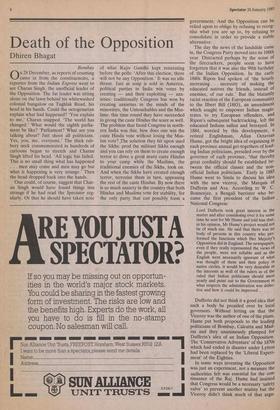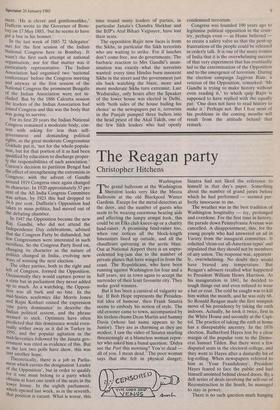Death of the Opposition
Dhiren Bhagat
O28 December, as reports of counting V came in from the constituencies, a reporter from the Indian Express went to see Charan Singh, the unofficial leader of the Opposition. The Jat leader was sitting alone on the lawn behind his whitewashed colonial bungalow on Tughlak Road, his head in his hands. Could the octogenarian explain what had happened? 'You explain to me,' Charan snapped. 'The world has changed.' What would the eighth parlia- ment be like? 'Parliament? What are you talking about? Just shoot all politicians. Yes, you, me, everyone.' The thick rub- bery neck commemorated in hundreds of cartoons began to stretch and Charan Singh lifted his head. 'All logic has failed. This is no small thing what has happened . . . men may come and men may go but what is happening is very strange.' Then the head dropped back into the hands.
One could, of course, suggest that Char- an Singh would have found things less strange if he had read the Spectator reg- ularly. Or that he should have taken note
of what Rajiv Gandhi kept reiterating before the polls: 'After this election, there will not be any Opposition.' It was no idle threat. Just as soap is sold in America, political parties in India win votes by creating — and then exploiting — anx- ieties: traditionally Congress has won by creating anxieties in the minds of the minorities, the Untouchables and the Mus- lims; this time round they have succeeded in giving the caste Hindus the scare as well. The problem that faced Congress in north- ern India was this: how does one win the caste Hindu vote without losing the Mus- lim vote? The solution they hit upon used the Sikhs: prod the militant Sikhs enough and you can rely on them to create enough terror to drive a great many caste Hindus to your camp while the Muslims, the traditional enemies of the Sikhs, look on. And when the Sikhs have created enough terror, terrorise them in turn, appeasing the rest of the caste Hindus. By now there is so much anxiety in the country that both Hindus and Muslims vote for stability, for the only party that can possibly form a government. And the Opposition can be relied upon to oblige by refusing to recog- nise what you are up to, by refusing to consolidate in order to provide a stable alternative.
The day the news of the landslide came in, the Congress Party moved into its 100th year. Distracted perhaps by the noise of the firecrackers, people seem to have forgotten that it was also the 99th birthday of the Indian Opposition. In the early 1880s Ripon had spoken of 'the hourly increasing . . . necessity of making the educated natives the friends, instead of enemies, of our rule.' But the blatantly racist reaction of the European community to the Ilbert Bill (1883), an amendment which sought to empower Indian magis- trates to try European offenders, and Ripon's subsequent backtracking, left the educated Indians sullen and betrayed. In 1884, worried by this development, a retired Englishman, Allan Octavian Hume, got the bright idea of organising in each province annual get-togethers of lead- ing Indian politicians, presided over by the governor of each province, 'that thereby great cordiality should lie established be- tween the official classes and the non- official Indian politicians.' Early in 1885 Hume went to Simla to discuss his idea with the new viceroy, the Marquis of Dufferin and Ava. According to W. C. Bonnerjee, a Bengali barrister who be- came the first president of the Indian National Congress: Lord Dufferin took great interest in the matter and after considering over it for some time he sent for Mr Hume and told him that, in his opinion, Mr Hume's project would not be of much use. He said that there was no body of persons in this country who per- formed the functions which Her Majesty's Opposition did in England. The newspapers, even if they really represented the views of the people, were not reliable and as the English were necessarily ignorant of what was thought of them and their policy in native circles, it would be very desirable in the interests as well of the rulers as of the ruled that Indian politicians should meet yearly and point out to the Government in what respects the administration was defec- tive and how it could be improved . . .
Dufferin did not think it a good idea that such a body be presided over by local governors. Without letting on that the Viceroy was the author of one of the plans, Hume put both proposals to the leading politicians of Bombay, Calcutta and Mad- ras and they unanimously plumped for Dufferin's idea of an Indian Opposition. The 'Conservative Adventure' of the 1870s which had ended in disaster under Lytton had been replaced by the 'Liberal Experi- ment' of the Eighties.
In some ways inventing the Opposition was just an experiment, not a measure the authorities felt was essential for the con- tinuance of the Raj. Hume had insisted that Congress would be a necessary 'safety valve' to prevent another mutiny but the Viceroy didn't think much of that argu-
moot. 'He is clever and gentlemanlike,' Dufferin wrote to the Governor of Bom- bay on 17 May 1885, 'but he seems to have got a bee in his bonnet.'
In the last week of 1885 72 `delegates' met for the first session of the Indian National Congress here in Bombay. It wasn't the first such attempt at national organisation, nor for that matter was it particularly representative. The Indian Association had organised two `national conferences' before the Congress meeting and anyway at the first session of the National Congress the prominent Bengalis of the Indian Association were not in- cluded. But by the 1886 Calcutta session the leaders of the Indian Association had Joined Congress and this was the body that was going to survive. For its first 20 years the Indian National Congress remained a moderate body, con- tent with asking for less than self- government and demanding political rights, as the great moderate Congressman Gokhale put it, 'not for the whole popula- tion, but for that portion of it as had been qualified by education to discharge proper- ly the responsibilities of such association.' Curzon's decision to partition Bengal had the effect of strengthening the extremists in Congress; with the advent of Gandhi around 1919 Congress once again changed its character. In 1920 approximately 57 per cent of the All India Congress Committee was urban, by 1923 this had dropped to 34.6 per cent. Dufferin's Opposition had taken to mass politics, had moved out of the debating chamber. In 1947 the Opposition became the new Raj. Gandhi, who did not attend the Independence Day celebrations, advised that the Congress Party be disbanded, but few Congressmen were interested in such sacrifices. So the Congress Party lived on, changing its character as the nature of Politics changed in India, evolving new ways of winning the next election.
The other parties, both to the right and left of Congress, formed the Opposition. Occasionally they would capture power in a state but in parliament they never added a13 to much. As a watchdog, the Opposi- tion was all bark and no bite. In the mid-Sixties academics like Morris Jones and Rajni Kothari coined the expression one party dominance' to describe the Indian political system, and the phrase seemed to stick. Optimists have often predicted that this dominance would even- tually wither away as it did in Turkey in 1950, and the popular agitation in the mid-Seventies followed by the Janata gov- ernment was cited as evidence of this. But as the last two polls have show, this was Just another hope.
Theoretically, there is a job in Parlia- ment which carries the designation 'Leader of the Opposition', but in order to qualify for It one must belong to a party which obtains at least one tenth of the seats in the lower house. In the eighth parliament, which opened last week, as in the seventh, that position is vacant. What is worse, this time round many leaders of parties, in particular Janata's Chandra Shekhar and the BJP's Atal Bihari Vajpayee, have lost their seats.
The opposition Rajiv now faces is from the Sikhs, in particular the Sikh terrorists who are waiting to strike. For if lunches don't come free, nor do governments. The barbaric reaction to Mrs Gandhi's assas- sination was exactly what the terrorists wanted: every time Hindus burn innocent Sikhs in the street and the government just sits back watching the blaze, more and more moderate Sikhs turn extremist. Last Wednesday, only hours after the Speaker of the lower house was elected in Delhi, with 'both sides of the house hailing his choice' as the newspapers put it, terrorists in the Punjab pumped three bullets into the head priest of the Akal Takth, one of the few Sikh leaders who had openly condemned terrorism.
Congress was founded 100 years ago to legitimise political opposition in the coun- try, perhaps even — as Hume believed to create a safety valve so that the pent-up frustrations of the people could be released in orderly talk. It is one of the many ironies of India that it is the overwhelming success of that very experiment that has eventually led to the extermination of the Opposition and to the emergence of terrorism. During the election campaign Jagjivan Ram, a veteran of the Opposition, remarked: `Mr Gandhi is trying to make history without even reading it,' to which quip Rajiv is supposed to have replied with the equally pat: `One does not have to read history to make it.' Perhaps not. But I fear most of his problems in the coming months will result from the attitude behind that remark.











































 Previous page
Previous page